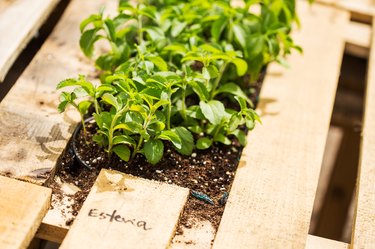
If you are trying to reduce your sugar consumption or cut back on calorie intake, you might be looking for foods and beverages made with sugar substitutes. Among the many different types of artificial sweeteners are sugar alcohols. One popular product is called stevia and before you use this or any other sugar substitute, it is important to understand what the product is and whether health concerns are associated with using it.
Artificial Sweeteners
Video of the Day
"Artificial sweeteners" is a general term that identifies products used in place of table sugar. They add sweetness to foods and drinks without all of the calories that sugar adds. Popular sugar substitutes include Equal -- made with NutraSweet, or aspartame; Sweet and Low, made with saccharin; and Splenda, made with sucralose. Sugar substitutes are very low in calories, or even calorie free, and they do not contain carbohydrates or contribute to tooth decay. They are added to many products and can be used when baking.
Video of the Day
Natural sweeteners include honey, molasses, maple syrup, date sugar and others. However, natural sugars are no healthier than table sugar and usually contain the same number of calories as table sugar.
The third category of artificial sweeteners is sugar alcohols.
Sugar Alcohols
Sugar alcohols are carbs that occur naturally in fruits and other plants, and can be manufactured. They are not calorie- or carbohydrate-free, but are lower in calories than table sugar. They are added to products such as ice cream, gum, candy, cookies and other products. Common sugar alcohols include erythritol, lactitol, maltitol, mannitol, sorbitol and others. Because sugar alcohols are a form of carbohydrates, they need to be used with caution by diabetics or those at risk for the disorder, notes the American Diabetes Association.
Stevia
Stevia falls under the general category of novel sweetener instead of one of the above categories. Stevia is a brush plant native to Central and South America, and its leaves contain steviol glycosides, which can be extracted from the leaves and used as a sweetener. Stevia can be found in stores under the names PureVia or Truvia. While stevia does come from a plant, highly refined stevia, unlike sugar alcohols, does not contain calories or carbs, but is found in nature and not manufactured like sugar substitutes. This makes it difficult to place stevia in one specific category. However, some products might add sweetness by combining stevia with a sugar alcohol such as erythritol, according to Harvard's School of Public Health.
Safety
Highly refined Stevia products that contain the steviol glycosides Rebaudioside A, or rebiana, have been approved for use, but formulas with other steviol glycosides or the use of the whole leaf is not yet considered safe, reports the American Dietetic Association. Stevia should be used in moderation, and a general guideline is to consume no more than 2 milligrams per pound of body weight daily.